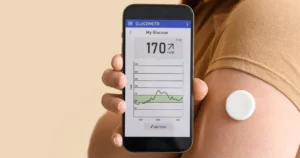For individuals with diabetes, it’s crucial to understand how different weather conditions can affect blood glucose levels. Each season, from the intense heat of summer to the frigid cold of winter, presents unique challenges and opportunities for managing diabetes. This comprehensive guide explores the effects of weather on diabetes and offers practical tips for maintaining stable glucose levels throughout the year.
Weather Effects on Diabetes
Summer Heat and Glucose Levels
- Hydration is Essential: High temperatures increase sweating, which can lead to dehydration. Dehydration concentrates blood glucose levels, making it important to stay well-hydrated.
- Insulin Sensitivity and Storage: Heat can enhance insulin absorption, potentially causing hypoglycemia. Proper insulin storage is crucial as extreme heat can degrade insulin, reducing its effectiveness.
Winter Cold and Blood Sugar
- Blood Sugar Variations: Cold weather can lead to higher HbA1c levels as the body uses more energy to stay warm, which can raise blood sugar levels.
- Reduced Physical Activity: Shorter days and cold temperatures can limit opportunities for outdoor exercise, affecting glucose management.
Seasonal Dietary Adjustments: Each season provides unique produce that can aid in diabetes management:
- Spring: Enjoy leafy greens like spinach and arugula, which are low in carbohydrates and high in fiber.
- Summer: Fresh berries are abundant and make for excellent low-glycemic snacks.
- Autumn: Add hearty vegetables like squash and pumpkin to your diet, offering essential vitamins without spiking blood sugar.
- Winter: Use root vegetables and citrus fruits to add flavor and nutrients to your meals while maintaining blood sugar levels.
Tips for Managing Diabetes Across Seasons
Staying Active Year-Round
- Indoor Exercises: During extreme weather, switch to indoor activities such as yoga, Pilates, or indoor swimming to stay active.
- Seasonal Gear: Choose breathable fabrics for summer and thermal wear for winter to stay comfortable and maintain regular exercise.
Monitoring and Adjusting
- Frequent Glucose Checks: Weather changes can unpredictably affect blood glucose levels. Increase the frequency of glucose checks to better manage and adjust insulin doses.
- Continuous Glucose Monitoring (CGM): Consider using a CGM for real-time glucose tracking, which can alert you to fluctuations caused by weather changes.
Mental Health Considerations
- Seasonal Affective Disorder (SAD): Reduced sunlight in winter can impact mood and motivation. Light therapy and vitamin D supplements may be helpful.
Effectively managing diabetes requires adapting to seasonal changes and their specific challenges. By staying informed about how weather affects glucose levels and implementing seasonal strategies, you can maintain better control over your diabetes year-round. Each season offers new opportunities to refine your management plan and enhance your overall health.




